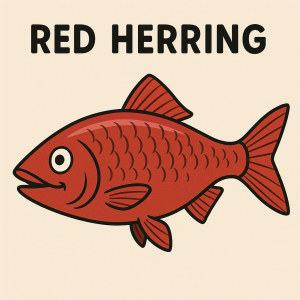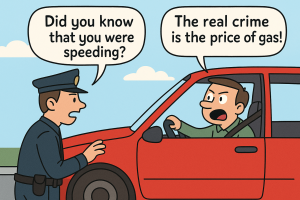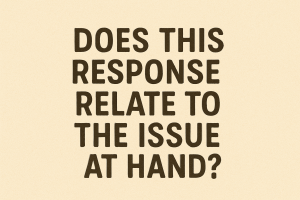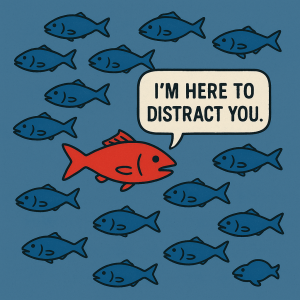Red Herrings
Kainan Jarrette and Diana Daly
What is a red herring?

A red herring is something irrelevant that’s introduced to distract from the actual argument.
The term comes from the old practice of using a strong-smelling, smoked herring to distract hunting dogs from a scent trail.
It’s also commonly used as a literary term, particularly in mystery novels, to describe something meant to distract the reader away from figuring out the real answer to a question (such as “who’s the murderer?”).
Examples


How to Spot a Red Herring
A red herring will often feel noticeable, because we tend to pick up on when a subject of conversation is being changed1. However, if the red herring is effectively appealing to our cognitive biases, we have a much harder time noticing it.
When you’re looking at any type of response to an issue or argument, ask yourself:

If it doesn’t — even if it feels good or you agree with the general idea — it’s a red herring.
Whataboutism
One of the most common types of red herrings is something usually referred to as “whataboutism.” Whataboutism is when someone deflects criticism or scrutiny by pointing to someone else’s wrongdoing.
Anyone who grew up with siblings probably encountered a form of this as a kid. Let’s say you and your brother are arguing and you end up calling him a jerk. In return, he gets angry and hits you. You tell your mom, who chastises your brother and tells him “Hitting is never okay!” But your brother responds by pointing to you and saying: “But what about her! She called me a jerk!”
Should you have called your brother a jerk? Probably not. But that doesn’t justify nor excuse his hitting you.
Why Red Herrings Matter
Let’s be clear: exploring the context of a situation, the potential hypocrisy of a person or group, or even related topics can have a lot of value. The problem comes when that’s used to distract from actually responding to the initial issue. If we don’t address one thing before moving on to another, we could easily get caught in a loop of diversions that doesn’t let us resolve anything. And addressing an issue usually isn’t difficult.
Let’s take the sibling example above. Imagine after your mother told your brother “Hitting is never okay!” he responded by saying “You’re right, I shouldn’t have hit my sister and it was wrong. I apologize. I’d like to talk about her calling me a jerk, though, as that hurt my feelings.”
This isn’t that much longer of a response, but probably strikes most of us as much more reasonable than “But what about…” — because it is! It’s actually addressing the issue before exploring something else.
Look Who’s Talking!

We can all make red herring arguments from time to time without meaning to. But if you see a speaker who frequently distracts from uncomfortable points, they’re likely doing so as an intentional rhetorical strategy, meant to manipulate the audience. This should raise serious red flags, as it undermines their credibility as an accurate source of information.
Knowledge Check: Red Herrings
Vocabulary
red herring
something irrelevant that’s introduced to distract from the actual argument
rhetorical strategy
any deliberate technique a speaker or writer uses to persuade, influence, or shape how an audience thinks or feels about an issue.
whataboutism
when someone deflects criticism or scrutiny by pointing to someone else’s wrongdoing
References
1 Cegala, D. J., Dewhurst, M., Galanes, G. J., Burggraf, C., Thorpe, J. M., Keyton, J., & Makay, L. (1989). A study of participants’ judgments of topic change during conversation: Global versus local definitions. Communication Reports, 2(2), 62–71. https://doi.org/10.1080/08934218909367485
Media Attributions
- Red Herring Title © ChatGPT is licensed under a CC0 (Creative Commons Zero) license
- Red Herring Comic 01 © ChatGPT is licensed under a CC0 (Creative Commons Zero) license
- Red Herring Comic 02 © ChatGPT is licensed under a CC0 (Creative Commons Zero) license
- Red Herring Text 01 © ChatGPT is licensed under a CC0 (Creative Commons Zero) license
- Red Herring Distraction © ChatGPT is licensed under a CC0 (Creative Commons Zero) license
a logical fallacy where something irrelevant is introduced to distract from the actual argument
the systematic ways our minds can lead us to misjudge, misunderstand, or ignore information
a type of red herring, where someone deflects criticism or scrutiny by pointing to someone else’s wrongdoing
any deliberate technique a speaker or writer uses to persuade, influence, or shape how an audience thinks or feels about an issue

